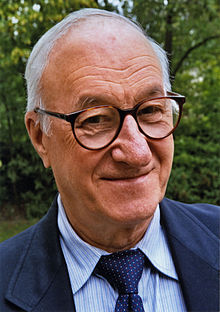When given the task about studying and research a theorist, I selected Albert Bandura blindly, and was a little nervous. I will tell you I learned a lot about this man and the theories that he set forth and studied. So here is a glimpse of my research, my paper, and the learning theories of Albert Bandura.

When discussing a learning theory, one usually starts thinking about how they learned, or maybe how they teach. They might also begin wondering how their student’s learn, or how they are interacting with the teaching. What is coming across? What isn’t working? A theory is a personal belief or system of thought that controls ones way of doing/thinking about something. Learning theories consist of many different beliefs and thoughts, and are continually argued, changed, and encouraged on a regular basis. Albert Bandura is what I would call a father of Psychology and learning theories, and is a leader to many.
Albert Bandura was born on December 4, 1925 in Mundare, a small town in Alberta, Canada. He lived a very simple life in his elementary and high school days, and was extremely successful. He attended college at the University of British Columbia, and received his B.A. in Psychology in 1949. The bachelor’s degree was not enough, and he continued his education receiving his Ph.D from the University of Iowa in 1952. It was his graduate schooling that really got him thinking about behaviors and specific learning theories. After graduating with his Ph.D., he eventually accepted a full time teaching position at Stanford University in 1953. Albert Bandura was an incredibly impressive and successful professor, with the world as his oyster, so many ideas to explore, and all at the young age of 28 (Boeree 1998, Pg. 1)
Bandura states, “ in the social learning view, man is neither driven by inner forces nor buffeted helplessly by environmental influences. Rather, psychological function is best understood in terms of a continuous reciprocal interaction between behavior and is controlling conditions” (Bandura 1977, Pg. 2). Bandura believed in a behavioral learning theory through observation and meditational processes. His observational learning expresses how children learn from simply observing others and their surroundings, and how they interact. While children usually observe and then follow or imitate, there is a process in-between observing and imitating, known as Meditational Processes. The focus of these two learning theories and beliefs, are that of Albert Bandura and reflect his own social learning outcomes and results.
References
Bandura, A. (1977). Social learning theory. Englewood Cliffs, NJ: Prentice Hall.
Boeree, G. C., Dr. (2006). Albert Bandura. Retrieved December 08, 2016, from http://webspace.ship.edu/cgboer/bandura.html